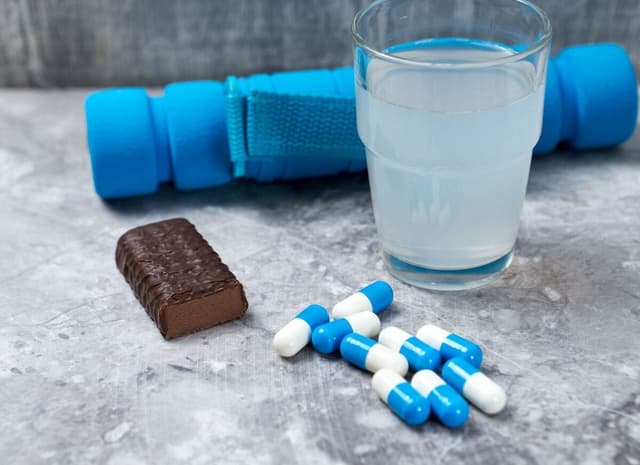Creatine and Aging: Can It Help Older Adults Maintain Muscle Mass?

October 5, 2024
As we age, maintaining muscle mass becomes increasingly important for overall health and well-being. For older adults, the gradual loss of muscle, known as sarcopenia, can lead to decreased mobility, increased risk of injury, and reduced quality of life. In recent years, creatine—a naturally occurring compound found in muscle cells—has garnered attention for its potential role in helping older adults maintain muscle mass and strength. In this article, we’ll explore the connection between creatine and aging, how it supports muscle health, recommended dosages, and the scientific evidence backing its benefits.
The Importance of Muscle Mass in Older Adults
Maintaining muscle mass is vital for older adults for several reasons:
- Enhanced Mobility: Adequate muscle mass supports physical activity and independence, allowing older adults to engage in daily tasks with ease.
- Injury Prevention: Stronger muscles can help protect joints and bones, reducing the risk of falls and fractures.
- Metabolic Health: Muscle tissue is metabolically active, which means it helps regulate blood sugar and improves insulin sensitivity, crucial for preventing age-related diseases like type 2 diabetes.
How Creatine Supports Muscle Health in Older Adults
Creatine may offer a range of benefits for older adults aiming to maintain or improve muscle mass, including:
- Increased Muscle Strength: Research suggests that creatine supplementation can lead to significant improvements in muscle strength, particularly when combined with resistance training.
- Enhanced Recovery: Creatine can help reduce muscle damage and inflammation post-exercise, promoting faster recovery and allowing older adults to train more effectively.
- Improved Muscle Mass: Studies indicate that creatine supplementation can contribute to increased lean body mass, which is essential for combating sarcopenia.
- Boosted Exercise Performance: For older adults who may struggle with high-intensity exercise, creatine can enhance overall exercise performance, making it easier to engage in strength training and physical activity.
Recommended Creatine Dosage for Older Adults
Our Top Recommendations

Optimum Nutrition Micronized Creatine Monohydrate Powder
Micronized for easy mixing, supports muscle growth and endurance.
See on Amazon$0.35 per 5g serving

Nutricost Creatine Monohydrate Micronized Powder
Third-party tested, non-GMO, 5g of pure creatine per serving.
See on Amazon$0.2 per 5g serving

NSF Certified, supports muscle power and recovery.
See on Amazon$0.46 per 5g serving

ProMix Creatine Monohydrate Powder
Micronized, additive-free, ideal for performance and recovery.
See on Amazon$0.36 per 5g serving

NOW Foods Sports Nutrition Unflavored
100% pure creatine, GMP certified, boosts strength and endurance.
See on Amazon$0.2 per 5g serving
When considering creatine supplementation, it’s important to determine the appropriate dosage. The standard creatine dosage recommendations typically involve a loading phase followed by a maintenance phase:
- Loading Phase: For the first 5–7 days, a daily dose of 20 grams (divided into 4 doses of 5 grams each) is commonly recommended. This helps saturate the muscles with creatine quickly.
- Maintenance Phase: After the loading phase, a daily dose of 3–5 grams is sufficient to maintain elevated creatine levels in the muscles.
It's important to note that older adults should consult a healthcare professional before starting any supplement regimen to ensure safety and efficacy. Individual factors such as existing health conditions, medications, and overall fitness goals should be considered when determining the right dosage.
Scientific Studies Supporting Creatine and Muscle Health
Numerous studies have investigated the effects of creatine supplementation on muscle health in older adults. Here are some key findings:
- Improved Muscle Strength: A study published in the journal Aging Clinical and Experimental Research found that older adults who supplemented with creatine experienced greater increases in muscle strength compared to those who did not. Participants engaged in resistance training while taking creatine, leading to enhanced gains in both muscle mass and strength.
- Sarcopenia Prevention: Research in The Journal of Nutrition, Health & Aging indicated that creatine supplementation, when combined with resistance training, significantly improved muscle mass and function in older adults at risk of sarcopenia.
- Increased Lean Body Mass: A meta-analysis published in the Journal of Cachexia, Sarcopenia and Muscle found that creatine supplementation positively impacted lean body mass in older individuals, underscoring its role in maintaining muscle health as we age.
- Cognitive Benefits: Some studies suggest that creatine may also have cognitive benefits for older adults, improving brain function and mental clarity, which can be particularly beneficial for overall well-being.
As aging can lead to a decline in muscle mass and strength, incorporating creatine supplementation may offer significant benefits for older adults looking to maintain their muscle health. With proper dosing and a commitment to regular physical activity, creatine can help improve strength, enhance recovery, and increase lean body mass.
If you’re an older adult seeking to preserve your muscle mass and enhance your overall quality of life, consider discussing creatine supplementation with a healthcare professional. Embrace the potential of creatine as a tool for healthy aging, and explore related content on nutrition and exercise to further support your fitness journey.
Call to Action: For more insights on how to enhance your fitness and nutrition, subscribe to our newsletter and stay updated with the latest research and tips!






